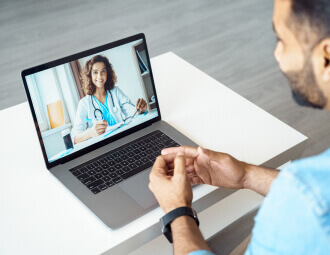Highlights
- Natural treatments for ADHD can support the effects of medication and bring their own benefits.
- Diet, sufficient physical activity, and mindfulness are just a few of the many natural ways to treat ADHD that have been proven beneficial.
- You should always consult a healthcare professional before choosing or taking dietary supplements or medications.
Medication is often the first-line choice for ADHD treatment, but it’s not equally effective for everyone. You may not tolerate stimulants well, consider stopping medication at some point, or simply want to try a more comprehensive strategy—this is where holistic approaches may help.
Many natural ways of treating ADHD symptoms, such as diet modification and exercise, can also improve overall health. Although in some cases, they cannot completely replace medication but rather serve as a backstop, it’s useful to know them, so let’s explore the most commonly recommended options below.
Understanding the ADHD Brain
MRI studies have revealed that the brains of people with ADHD often are quite different from those of people who don’t have ADHD. This can include structural differences, differences in the way signaling hormones called neurotransmitters work, and different patterns of neural connectivity in important regions of the brain. These may be responsible for some of the complex symptoms of ADHD, including impulsivity and difficulty maintaining focus.
ADHD medications, although they work in different ways, target these neurotransmitters. For example, they balance the quantity and activity of brain hormones dopamine and norepinephrine. On the other hand, non-medication options like exercise can also
Top 9 Natural Treatments for ADHD
Balanced Diet
Several research studies have analyzed the role of how diet may relate to ADHD.
Foods to Incorporate
Healthy Fats:
Foods to Limit or Avoid
Caffeine:

Artificial Food Colorings: While it is not currently understood how this process works, there is a growing body of evidence linking

Nutritional Supplements
Treatment with supplements may also help improve ADHD symptoms. Research has identified the following:
-
Probiotics and Fibers: The gastrointestinal tract (gut) is believed to communicate with and influence the function of the brain via hormones and components of the immune system.
Some studies[7] have shown that ADHD may be related to imbalance and disruption of the bacteria in your gut—known as gut microbiota. Taking supplements such as probiotics or fiber may help maintain healthy gut microbiota and improve some symptoms of ADHD.Probiotics can be found in various forms including gummy supplements, or in fermented foods and drinks like kefir, kombucha, and sauerkraut. Fiber is found in fruits and vegetables, brown rice, chickpeas, and psyllium husk, among others.
- Vitamin D and Magnesium:A study in 2021 found that these supplements helped reduce ADHD symptoms in children. Vitamin D is found in certain types of mushrooms, fatty fish, and egg yolks; it can also be found as a supplement or in fortified milk.
You should always talk to your healthcare provider before taking any supplements or herbal remedies to ensure they are right and safe for you.
Regular Exercise
Regular exercise
Behavioral Therapy
Behavioral therapy has long been a key tool for treating mental health disorders, and ADHD management is no exception. This type of therapy focuses on modifying specific behaviors with the goal of improving daily functioning.
A more specific type of therapy, cognitive-behavioral therapy (CBT) focuses on redesigning or rerouting a person’s negative thought processes, replacing them with more productive, positive ones. For example, CBT can help reduce the impulsivity and procrastination that characterize ADHD by boosting self-confidence and teaching time management strategies to improve focus.
In addition,
Mindfulness and Meditation
Mindfulness and meditation have become increasingly popular over the last two decades and have a breadth of mental health applications.
Time Management and Organizational Skills for Adults
A few key components of effective time management are the ability to prioritize tasks, determine how long they will take, and complete them on time. For most people, these may come naturally, but for those with ADHD, it can feel nearly impossible.
A new recommendation published by the Cleveland Clinic describes an approach that helps people think of tasks as agreements, and unfinished tasks as broken agreements. This helps create a sense of liability and responsibility that can be motivational for adults with ADHD; they also encourage using rewards when tasks are completed to strengthen motivation. Also, ordinary time-management tools like calendars, planners, and digital reminders can make long-term planning more feasible. Many of these tools are readily available as apps on smartphones.
Spending More Time in Nature
Spending time outdoors has benefits for everyone but it can also be a “natural medicine” for ADHD. This connection between symptom reduction and time spent in nature is known as the “green time” effect and is supported by
While the effects of spending time in nature on adults with ADHD requires additional research, outdoor activity
Improved Sleep Habits
People with ADHD often experience sleep disorders, which creates a cycle that can worsen ADHD symptoms. Common sleep challenges can include difficulty falling and staying asleep and are thought to be related to dysregulation of neurotransmitters like dopamine and norepinephrine. Other sleep difficulties may include breathing disorders such as sleep apnea, restless leg syndrome, and narcolepsy.
Education on the components of good sleep ‘hygiene’ can be a useful tool in combating ADHD symptoms and its associated sleep disorders. Some good sleep hygiene practices include establishing a regular bedtime and waking time, a calming pre-sleep routine, reduced screen time before bed, avoiding caffeine later in the day, and using weighted blankets or tools like noise machines.
Aromatherapy for Relaxation
Aromatherapy is the therapeutic use of essential oils that are extracted from flowers, herbs, or trees. Although there is limited research on the application of aromatherapy in managing ADHD symptoms,
Aromatherapy is believed to be effective because of its effect on the brain’s limbic system, which is responsible for regulating emotions and behavior. It is often used to improve sleep, reduce stress and anxiety, and promote relaxation:
- Lavender is known for its calming effects, relaxation, and anxiety reduction.
- Vetiver is often known as the “oil of tranquility” and is believed to improve focus and reduce restlessness.
- Cedarwood is associated with improved concentration and reduced impulsivity.
- Chamomile has calming effects that can aid in managing restlessness and improve sleep quality in people with ADHD.
Note: when considering aromatherapy for ADHD, please consult a healthcare professional to ensure safety. Essential oils can be potent and cause adverse reactions such as skin irritation or allergic responses.
Finding the Right Balance for Managing ADHD
Managing ADHD often requires a balance of multiple approaches that may include medication management, therapy, and lifestyle changes. This combination must be tailored to individual needs, but even with a thought-out plan, it can take time to achieve significant results. The choice of natural remedies for ADHD, either with medication or without it, includes a trial-and-error period. However, once you pass it, you might find techniques and approaches that will become your long-term ongoing support.
Note that it’s important to consult a healthcare professional both for an accurate diagnosis and before taking any nutritional supplements or medications to manage ADHD. Each person’s journey with ADHD is unique, so not all treatments will work equally for everyone, and a medical expert can create a personalized plan. Consider online ADHD management for professional strategies to manage your symptoms.
Summing Up
While medication remains a primary resource for treating ADHD, there are many natural remedies that can complement it. You can try maintaining a balanced diet, incorporating regular exercise, practicing mindfulness and meditation, and exploring talk therapies. Holistic treatment for ADHD may not work for everyone but it can be a valuable component of a comprehensive approach.
If you want to see a healthcare provider to go through an ADHD assessment and receive an individualized treatment plan, book your appointment at MEDvidi today.












